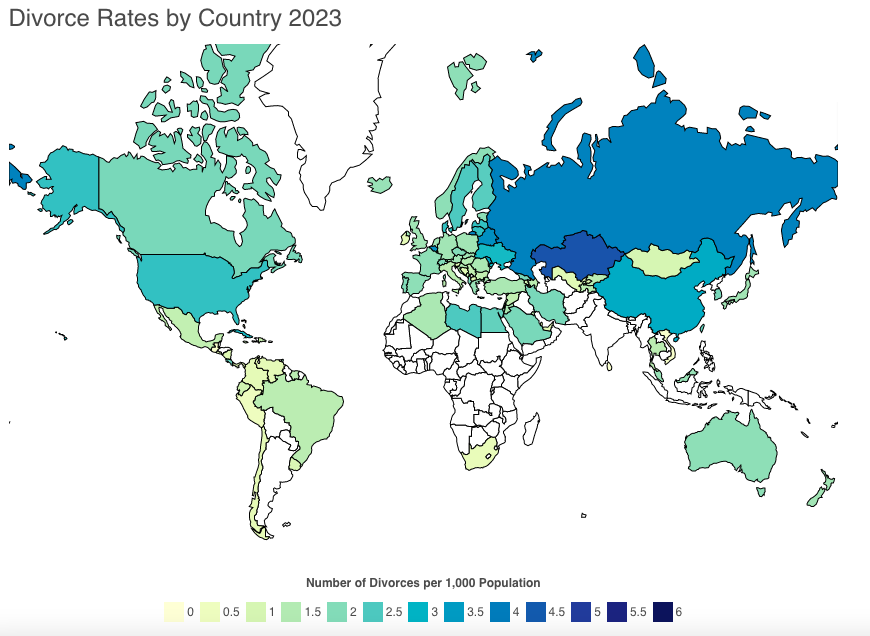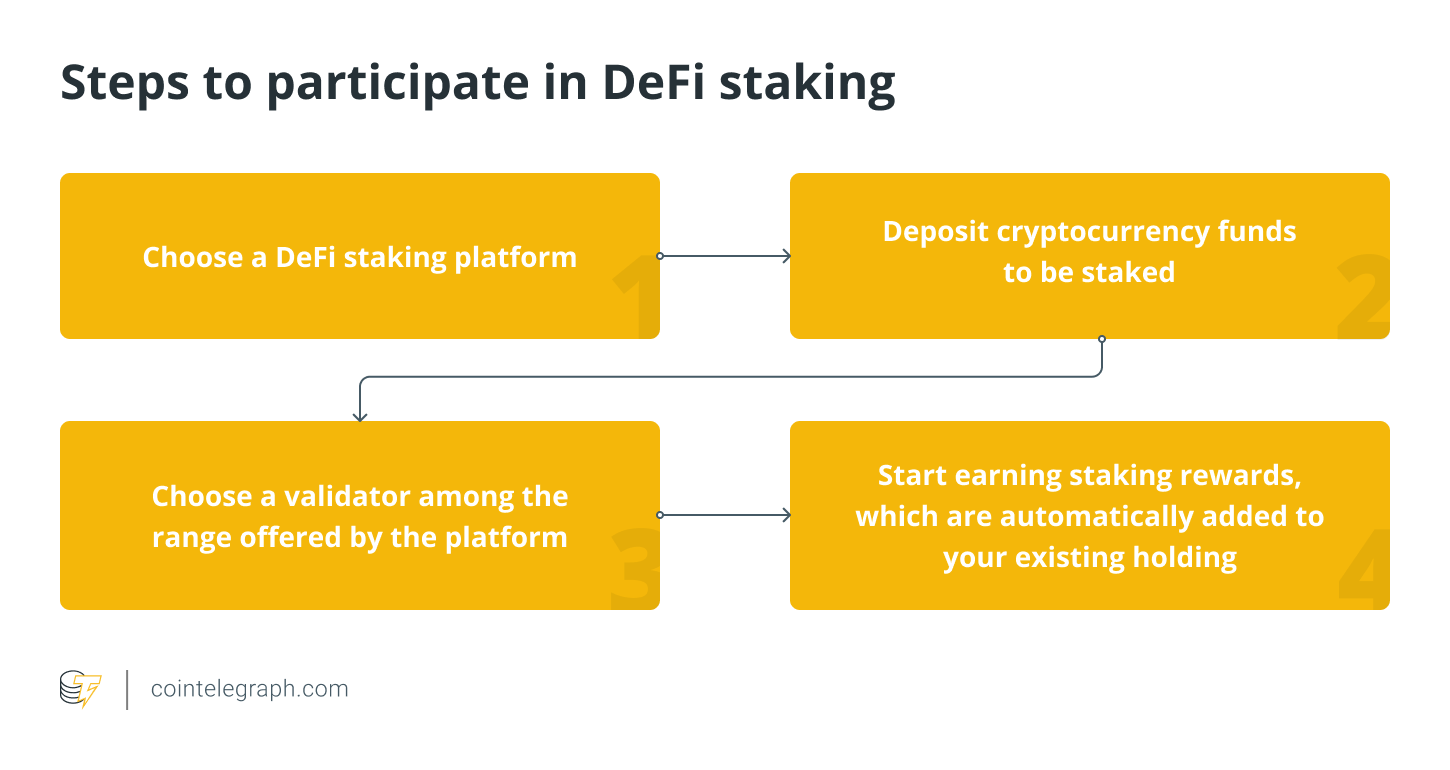Most crypto investors probably aren’t thinking about divorce or what will happen to their digital assets in the event of separation, but lawyers say it’s becoming a very common scenario as more people hold crypto assets.
Last year, market research firm GWI suggested that as much as 10.2% of global internet users aged 16 to 64 own crypto, with most ownership skewed toward nations experiencing high inflation or fluctuation in the value of their national currency.
Independent data and statistics tracker World Population Review suggests the divorce rate worldwide varies between lows of 0.15 divorces per 1,000 residents in Sri Lanka to highs of 5.52 per 1,000 people in the Maldives.

Phát biểu với Cointelegraph, Claire Walczak, một cộng sự cao cấp từ công ty luật độc lập Lander & Rogers, người làm việc trong ngành luật gia đình và mối quan hệ của công ty, cho biết các luật sư gia đình đang nhìn thấy một số lượng ngày càng tăng các giải quyết ly hôn có tài sản kỹ thuật số.
She says it’s a “rapidly changing and evolving area of law,” so it’s important to have specialist family law advice if you have a matter involving digital assets.
Theo Walczak, một khi thủ tục ly hôn bắt đầu, tòa án theo một quy trình để xác định các vấn đề tài sản và tài chính sẽ được giải quyết như thế nào.
Điều này có thể bao gồm việc xác định tài sản nào có sẵn để phân chia, đánh giá những đóng góp tương ứng của các bên, xem xét liệu nó có công bằng và công bằng để thực hiện bất kỳ điều chỉnh nào, và đánh giá nhu cầu tương lai của mỗi bên.
Quy trình tương tự cũng áp dụng khi xử lý tài sản kỹ thuật số. Cả hai bên trong ly hôn có nghĩa vụ phải tiết lộ tất cả các tài liệu liên quan đến tài sản của họ, kỹ thuật số hoặc cách khác
Walczak says both parties to a property settlement are entitled to retain the crypto as part of their overall property settlement entitlements, regardless of whose name it is held.
If both parties seek to retain the crypto and fail to reach an agreement, courts may consider factors such as, who paid for the crypto, and who owns the wallet, when deciding who retains the asset.
“As part of this process, the court identifies and values the existing assets of the parties, which includes all digital assets,” Walczak said.
“Trong trường hợp tiền điện tử, giá trị của loại tài sản được xác định bởi thị trường mở và có thể được đánh giá thông qua một cuộc trao đổi”, bà nói thêm.
Biến động thị trường có thể ảnh hưởng đến giá trị
The crypto market can be volatile at the best of times, with exchange collapses and other factors pushing values down without warning.
Bitcoin (BTC) — tiền điện tử lớn nhất theo vốn hóa thị trường – đạt mức cao nhất mọi thời đại trên $68,000 vào ngày 10 tháng 11 năm 2021, nhưng kể từ đó đã mất đi một phần đáng kể giá trị của nó và nằm ở mức khoảng $28,000 vào thời điểm viết bài viết.
Recent: Bitcoin is on a collision course with ‘Net Zero’ promises
Walczak cho biết sự biến động nhanh chóng và nhanh chóng trong giá trị tiền điện tử có thể là một yếu tố khi chia tách tài sản trong quá trình ly hôn.
“This can pose a risk to clients seeking to retain a large proportion of their property settlement entitlements in the form of cryptocurrency. This may need to be factored into the property settlement,” Walczak said.
“Một khi giá trị được xác định, các bên có thể đàm phán về việc ai sẽ giữ lại tiền điện tử hoặc, nếu không bên nào muốn giữ lại tiền điện tử, liệu nó sẽ được bán”, bà nói thêm.
Bà lưu ý rằng một cân nhắc khác đối với luật sư gia đình là những người đã mua lại mật mã như một tài sản đầu tư phải trả thuế lợi nhuận vốn đối với bất kỳ xử lý, trao đổi hoặc hoán đổi.
Theo Walczak, nếu cả hai bên trong ly hôn đồng ý rằng crypto nên được bán như một phần của việc giải quyết tài sản, thì trách nhiệm thuế lợi nhuận vốn sẽ được thực hiện và tạo thành một phần của hồ bơi tài sản.
“If, however, a party elects to retain cryptocurrency as an investment, then the capital gains tax liability will not be triggered, and the party retaining that asset may hold substantial unrealized capital gains,” Walczak said.
“Once it is determined who will retain the cryptocurrency or whether it will be sold, this can be documented in court orders,” she added.
According to the legal research platform Lexology, the case law on issues relating to cryptocurrency and its value is limited. However, there have been several high-profile cases in recent years where the value of crypto assets has taken center stage.
Lexology cites the 2020 Australian case of Powell vs. Christensen, where one party in divorce proceedings had purchased crypto, and the other sought the digital asset to be valued at its original purchase value rather than the market price.
The party who purchased the crypto argued that its value had decreased significantly since the purchase but did not disclose any documentation to support the case.
Ultimately, the Family Court of Australia determined the purchase value should be used for the divorce settlement rather than the reduced market value.
Staking and divorce
Walczak says crypto staking rewards can also form part of either spouse’s income and are recorded on their individual tax returns — similar to how dividends are dealt with.
Crypto staking involves locking up crypto holdings to earn interest or rewards. Staking is also how specific blockchain networks verify transactions.
“This will have the effect of increasing that spouse’s taxable income, which may impact upon their final property settlement entitlements,” she said.

She also noted that if a spouse elects to retain the “crypto staking rewards,” they will be retaining a potential income-generating asset, which may impact upon that party’s property settlement entitlements.
A party may also request to be paid in a particular currency, which could include crypto; however, Walczak says a party can’t elect to pay another party in a currency where it is seen to disadvantage the recipient of that payment.
Laws in place to keep everybody honest
In a recent case, the divorce proceedings of a New York couple took a turn after a forensic accountant helped track down the husband’s stash of BTC, which he was trying to hide from his wife.
Australian digital assets lawyer Joni Pirovich told Cointelegraph that broadly, crypto tokens are included in the pool of assets for division in a divorce.
Pirovich, the principal at Blockchain & Digital Assets, also noted specific laws requiring each spouse to be truthful about the assets and other forms of property owned.
During her career, she has already had experience with crypto divorce cases and revealed there are options available to help track down any hidden crypto.
According to Pirovich, one of the parties often knows the other has purchased crypto, but the other is not being truthful or doesn’t know how to aggregate the information.
“In some cases, a ‘legal request’ is made of the other party to produce the information,” she said.
“In other cases, I have provided contacts such as crypto tax specialists or crypto forensic specialists to assist with identification of crypto tokens held, and profits/losses made from crypto token activities to assets with the fair and equitable division of property in a divorce,” she added.
Prenuptial agreements and crypto
A prenuptial agreement, or pre-nup, is a common legal agreement a couple makes before they marry concerning the ownership of their respective assets should the marriage fail.
According to Pirovich, crypto can be included in a binding financial agreement, including a prenuptial style agreement.
She says if a binding financial agreement exists, then specific entitlements to specific assets, such as crypto tokens, must be honored according to that agreement.
Recent: Wife finds husband’s Bitcoin stash amid divorce proceedings
However, if there is no pre-nup, then factors such as the length of the marriage, financial and non-financial contributions throughout the marriage, and whether one party will become the primary or substantial carer of any children are relevant factors in splitting the asset pool.
“Often, the party not involved in crypto tokens does not wish to receive any share of crypto tokens but rather the fiat currency amount invested, or their share of profits on the sale of the crypto tokens paid to them in fiat currency,” Pirovich said.
Ultimately, to avoid any issues down the track, she advises honest and open discussions with a partner about finances on a regular basis.
Recent: From cricket to crypto: AB de Villiers ventures into Web3
“There can be emotional reasons why a person seeks to maintain a level of financial independence from the marriage and assets treated as jointly owned by the couple. This tends to come up for people reentering marriage after a first divorce,” Pirovich said.
“At least annual discussions should be had about crypto and the couple’s financial position as part of annual tax return filing obligations, and at least every three years when the couple considers their wills and estate planning documents and revisions required,” she added.

























